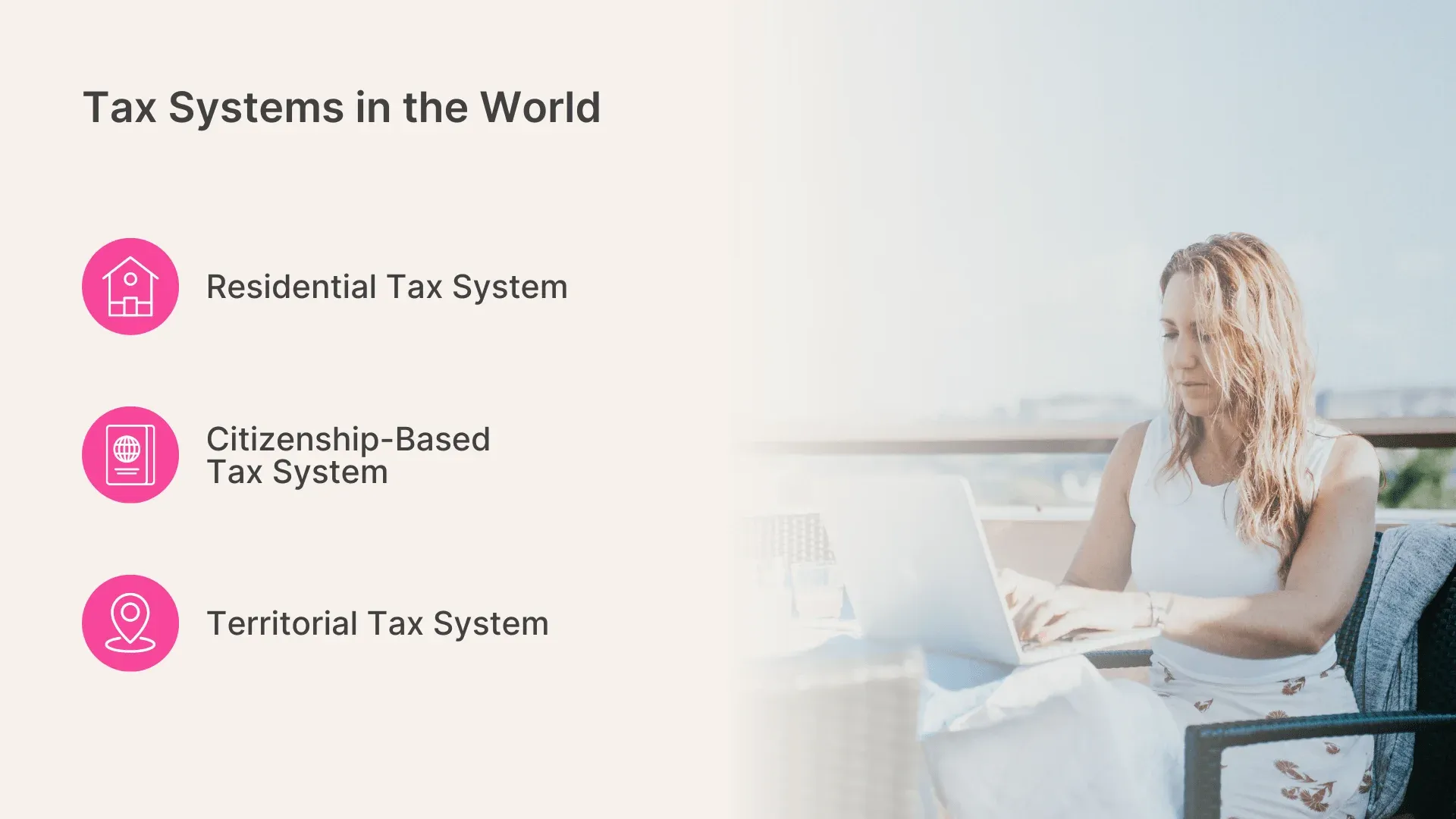Digital Nomad Taxes: Your Guide to Legally Travel and Work Remotely
Learn how to navigate the complex tax rules for digital nomads. This guide covers residency, income, tax systems, nomad visas and more.


You want to escape the 9-to-5 grind and enjoy more freedom and flexibility in your life. You are already picturing yourself working remotely from different locations while exploring new cultures and using just your laptop to earn a living.
It's a hell of a lifestyle, isn't it?
We get it. But before you pack your bags and book your flight, there is a big challenge you will need to overcome, and it's the one most digital nomads struggle with. We are talking about digital nomad taxes.
When being a digital nomad, you might have to comply with the tax laws of the countries in which you spend most of your time and potentially those in your own country, which can vary widely. You will also deal with visa requirements, limiting how long you can stay in a country and what kind of work you can do.
And if you are a US citizen, on top of all those things, you are still required to pay taxes to the IRS, even if you live and work abroad.
In this article, we will attempt to give you a comprehensive guide on managing your taxes, visas, and other tax rules while working as a digital nomad. We will also provide you with some practical tips on planning your taxes and making the most of your experience as a nomad. So, if that's what you were looking for, keep reading.
Where Do Digital Nomads Pay Taxes?
Let's get the most asked question out of the way: do digital nomads pay taxes?
The answer is yes, digital nomads do pay taxes indeed, although it's one of the biggest struggles they encounter during their journey.
A significant majority of digital nomads tend to pay taxes in their home country or where they spend most of their time. However, it's not uncommon for digital nomads to pay taxes in multiple countries.
A very small percentage of digital nomads do not pay taxes at all. This could be due to various reasons, such as earning below the taxable income threshold, residing in tax-friendly countries, or, unfortunately, tax evasion.
It's Not That Simple: The Complexities of Taxes for Digital Nomads
The reality of taxation for digital nomads is far from straightforward. It's a gray area that often leaves digital nomads navigating a labyrinth of outdated laws and regulations that haven't quite caught up with the modern reality of remote work.
Let's consider a hypothetical scenario: Marco, a digital nomad from Italy, decides to deregister as a resident in his home country and fly to Bali to live and work. He assumes that by doing this, he's free from the obligation of paying taxes in Italy. However, this is a common misconception and is mostly incorrect.
Many developed countries, including Italy, have in fact what's known as a tax residency fallback principle. This principle essentially means that if you're not a tax resident in another country, you're automatically considered a tax resident in the last country where you were a resident. So, in Marco's case, unless he becomes a tax resident of Indonesia (or another country), he would still be considered an Italian tax resident for tax purposes!
This is just one example of the many complex tax laws that digital nomads need to navigate. Each country has its own tax laws and treaties, and understanding these can be daunting. But don't worry, we will try to unpack them in the following paragraphs.
Digital Nomads and the 3 Tax Systems
Before even talking about all the nuances, it's important to understand that different countries have different tax systems. There are generally three types of tax systems: residential, citizenship-based, and territorial.

- Residential Tax System: Countries with a residential tax system tax residents on their worldwide income. The criteria for determining residency can vary, but it's often based on the amount of time spent in the country.
- Citizenship-Based Tax System: Only two countries, the U.S. and Eritrea, tax based on citizenship. This means that citizens are required to file taxes on their worldwide income, regardless of where they live.
- Territorial Tax System: Countries with a territorial tax system only tax income earned within their borders. This can be advantageous for digital nomads who earn income from foreign sources.
Although they seem pretty straightforward, there is a lot of confusion with terms like residency, domicile, citizenship, etc. Let's look at them one by one.
Residency vs Domicile
While the concepts of residency and domicile might seem similar, they have distinct meanings in tax law.
Residency generally refers to the place where you live at a particular time. You can be a resident of multiple countries in a single year if you live in each for a certain period. The specific duration can vary by country, but it's often around 183 days in a calendar year.
Domicile, on the other hand, is more about your long-term home - the place you intend to return to after being away. It's possible to have only one domicile at a time, and it's typically the country you consider your permanent home, regardless of where you're currently living. Your domicile can impact your tax obligations, especially if you maintain significant ties to that country.
Residency vs Tax Residency
These are probably two of the most confusing terms that also seem similar but are not.
Residency is where you live, while tax residency is where you're legally obligated to pay taxes. The criteria for determining tax residency can vary greatly by country. They can be based on factors such as the amount of time you spend in the country, your employment status, and the location of your main home.
For example, you might be a resident of Bali because you've been living there for a year, but if you're a UK citizen and have substantial ties to the UK, you could still be considered a UK tax resident. This means you're obligated to report your worldwide income to the UK tax authorities, even if you're living in Bali.
Tax Residency vs. Citizenship
Another important difference to understand when it comes to digital nomad taxes is the the one between 'citizenship' and 'tax residency'.
Your citizenship is typically where you were born or where your home country is. It's the place you typically consider 'home', even if you're not currently living there.
On the other hand, your tax residence country is where you are legally considered a resident for tax purposes. As we've discussed, this could be determined by factors like the number of days you spend in the country, your ties or 'substance' there, and other criteria set by the country's tax laws.
It's possible for your home country and tax residence country to be the same, but for many digital nomads, they're different. You might be a citizen of one country but spend enough time in another country (or have enough substance there) to be considered a tax resident.
Tax Residency and the '183 Days Rule'
When it comes to digital nomad taxes, tax residency is a term you'll also come across often. Simply put, a tax resident is someone who is required to pay taxes in a particular country because they live or earn income there. Each country has its rules to determine who its tax residents are, which can significantly affect digital nomads.
One such rule that's common across many countries is the 183-day rule. This rule essentially states that if you spend more than 183 days in a country within a tax year, you're generally considered a tax resident of that country. This could mean that you're required to pay tax on your worldwide income in that country, not just the income you earn within its borders.

Substance and Its Importance in Determining Tax Residency
While the 183-day rule is a common guideline, it's not the only factor determining tax residency. In fact, it's just the tip of the iceberg. The concept of 'substance' plays a crucial role in shaping your tax obligations. This can make or break your tax obligations.
Substance refers to your real and significant ties or interests in a country. It's not just about physical presence but rather about the depth of your connections to a place. For instance, you might ask yourself:
- Do you own property in the country?
- Is your family based there?
- Do you have a local bank account or investments?
- Are you registered with local authorities for utilities, healthcare, or other services?
All these factors contribute to your 'substance' in a country.
Countries look at substance because they want to tax people who use their resources and infrastructure meaningfully.
So, even if you spend less than 183 days in a country but have substantial ties there, you could still be considered a tax resident.
Conversely, spending more than 183 days in a country without real ties or interests might not make you a tax resident.
Territorial Tax and the Myth of the Flag Theory
The territorial tax system, which taxes individuals only on the income they earn within a country's borders, has given rise to what's known as the "Flag Theory". This theory suggests that you can minimize or even eliminate your tax obligations by strategically choosing where to plant your "flags" (i.e., where to live, where to bank, where to incorporate your business, etc.).
However, the Flag Theory is largely a myth. While it's true that the territorial tax system can be advantageous for digital nomads who earn income from foreign sources, it's not as simple as just moving to a country with a territorial tax system and expecting to pay no taxes. Many countries have specific rules and regulations in place to prevent this kind of tax avoidance, and failing to comply with these rules can lead to serious consequences.
Moreover, as we said in previous paragraphs, your tax obligations are not solely determined by where you earn your income. Other factors, such as your tax residency, your domicile, and the tax laws of your home country, can also come into play.
Therefore, we highly recommend seeking professional tax advice and fully understanding your tax obligations before making any major decisions based on the Flag Theory.

Tax Evasion vs Tax Optimization
When it comes to taxes, it's important to understand the difference between tax evasion and tax optimization.
Tax evasion is the illegal act of not paying legally due taxes. This can include actions like deliberately underreporting income, overstating deductions, or not filing a tax return at all. Tax evasion is a crime and can result in penalties, fines, and even imprisonment.
On the other hand, tax optimization is the legal practice of minimizing your tax liability through deductions, credits, and other means provided by tax laws. For example, contributing to a retirement account to reduce your taxable income is a form of tax optimization.
While tax optimization is legal and often a smart financial strategy, it's important to ensure your actions don't cross the line into tax evasion. This line can sometimes be blurry, especially for digital nomads navigating the complex world of international tax law.
To do so, it's always recommended to seek professional advice to ensure you're meeting your tax obligations while taking advantage of legal opportunities to minimize your tax liability.
Understanding Local Source Income
'Local source income' is another tax term that digital nomads need to be familiar with. Simply put, local source income is the income you earn in a specific country. This could be from providing services, selling products, or other income-generating activities within that country.
The tax implications of local source income can be significant for digital nomads. Generally, even if you're not a tax resident of a country, if you earn local source income there, you may still be liable for taxes on that income. This means that if you're a digital nomad working for clients in different countries, you could potentially face tax obligations in each of those countries.
Corporate Taxes vs Personal Taxes
Now that we've discussed what a local source of income is, you need to be aware of the fact that income can actually come from different sources. For each type of income, you might have to pay a different tax, which is key to knowing if you plan to optimize your taxes or even build your tax strategy from scratch.
But before we get into the nitty and gritty of each tax type you might need to be liable for as a digital nomad, we need to talk about another fundamental concept, which is the difference between corporate taxes and personal taxes.
The main difference is that corporate taxes are levied on a company's profits (or sometimes revenue), while personal taxes are levied on an individual's income.
For digital nomads, this distinction can be particularly relevant. For instance, you might be a tax resident in one country (and thus subject to personal taxes), but your company could be registered in another country (and thus subject to corporate taxes). So don't confuse these tax liabilities!
If you are not a Digital Nomad with US citizenship or residency, you can skip the next couple of paragraphs by clicking on the button below.
US Taxes for Digital Nomads: A Unique Scenario
When it comes to taxes, US digital nomads find themselves in a unique situation. Unlike most countries, the United States taxes its citizens on their worldwide income, regardless of where they live or work. This means that if you're a US citizen or resident, even if you're a digital nomad who spends most of your time outside the US, you're generally required to file a US tax return and may owe US taxes.
Filing Requirements for American Digital Nomads
As a US citizen or resident, you're required to report all your income to the IRS, whether it's earned in the US or abroad. This includes wages, self-employment income, rental income, dividends, and more.
If you're employed by a US company, they'll typically withhold taxes from your wages and send them to the IRS on your behalf. If you're self-employed or your employer doesn't withhold taxes, you may need to make estimated tax payments throughout the year.
Tips and Advice for US-Based Digital Nomads
While the US tax system can seem daunting, there are provisions that can help reduce the tax burden for digital nomads. For instance, the Foreign Earned Income Exclusion allows qualifying US citizens and residents to exclude a certain amount of their foreign-earned income from US tax. There's also the Foreign Tax Credit, which can reduce your US tax liability if you've paid or accrued taxes to a foreign country.
State Taxes for US Digital Nomads
For US digital nomads, federal taxes aren't the only concern. State taxes can also play a significant role in your tax obligations. Each state in the US has its own tax laws, and your tax situation can change dramatically depending on which state you're considered a resident of, or even which states you spend time in.
How Working from Different States Can Affect Tax Obligations
Some states, like Florida and Texas, have no state income tax, while others, like California and New York, have high state income tax rates. If you're a resident of a high-tax state but spend most of your time in no-tax states (or outside the US), you could potentially still be liable for state taxes in your resident state.
Furthermore, some states have 'convenience of the employer's rules, which could subject you to state taxes if you're working remotely for a company based in that state, even if you're not physically present in the state.
Comparison of Tax Policies in Different States
Here's a comparison of the state income tax policies in a few key states:
| State | Income Tax Rate | Tax Information |
|---|---|---|
| California | 1% - 13.3% | High tax rates; taxes worldwide income of residents |
| New York | 4% - 8.82% | Taxes worldwide income of residents; has a ‘convenience of the employer' rule |
| Florida | 0% | No state income tax |
| Texas | 0% | No state income tax |
| Nevada | 0% | No state income tax |
| Washington | 0% | No state income tax |
| Arizona | 2.5% - 8% | Progressive tax rates based on income; include a 3.5% surcharge on income over $250,000 for single filers and $500,000 for joint filers |
| Illinois | 4.95% | Flat tax rate regardless of income |
| Massachusetts | 5% | Flat tax rate regardless of income |
| Pennsylvania | 3.07% | Flat tax rate regardless of income |
If you instead want to learn more about digital nomad taxes for US citizens, check out our dedicated guide.
Types of Personal Taxes for Digital Nomads

Now that we got out of the way all those difficult terms, let's move on to the most interesting part: how to optimize your taxes.
As a digital nomad, you may be subject to various types of personal taxes, depending on your income sources and tax residency.
Some of the most common tax types that many countries have in common are:
- Income Tax: This is a tax on your earnings, which could include wages, self-employment income, rental income, and more. The rate usually depends on the amount of income you earn.
- Dividend Tax: If you own shares in a company and receive dividends (a share of the company's profits), you may have to pay tax on these dividends.
- Social Security Tax: In some countries, you may be required to contribute to social security systems, which fund things like pensions and healthcare. This is typically a percentage of your income.
- Capital Gains Tax: If you sell an asset (like shares or property) for more than you bought it for, the profit is a capital gain, and you may have to pay tax on this gain.
Tax Treaties and Double Tax Agreements
Now, let's move on to the next aspect to be aware of when optimizing your digital nomad taxes: tax treaties and double tax agreements.
These are essentially agreements between two countries to avoid the issue of double taxation - that is, when the same income you earn is taxed twice. And you surely want to avoid that.
Here's how they work: let's say you're a tax resident of Country A but earn income in Country B. Without a tax treaty, both countries could claim the right to tax that income. But if there's a tax treaty in place, it will set out rules to determine which country has the right to tax the income or how the taxation rights are shared between the two countries.
Digital Nomad Visas and Their Tax Advantages
Digital nomad visas are a relatively new type of visa that some countries offer to attract digital nomads and remote workers. These visas allow individuals to legally live and work in the host country for a certain period, typically a year or more.
The tax implications of digital nomad visas can vary greatly depending on the country, but here's an overview of some countries that offer digital nomad visas and their tax implications:
- Portugal: Portugal offers a Digital Nomad Visa (D8) for remote workers who want to live and work in the country for up to 1 year (Temporary Stay Visa) or 2 years (Residence Visa). To qualify, you need to have a monthly income of at least €2,800, four times Portugal's minimum wage. You must also provide proof of tax residence, employment or freelancer contract, NIF, and Portuguese bank account.
- Colombia: Colombia has a Digital Nomad Visa (V) for remote workers who want to stay and work in the country for up to 2 years. To qualify, you need to have a monthly income of at least $900, which is three times the minimum wage in Colombia. You must also provide a letter of employment, international health insurance, and no entry visa required.
- Argentina: Argentina has a Temporary Residence Permit for Remote Workers who want to live and work in the country for up to 1 year, renewable for another year. To qualify, you need to have a monthly income of at least $1,000 if you are an individual or $1,500 if you are a family. You also need to provide proof of employment or income, health insurance, and criminal record check.
- Canada: Canada has a Temporary Work Permit for Remote Workers who want to work in the country for up to 2 years. To qualify, you need to have a valid job offer from a Canadian employer, proof of education and work experience, medical exam and biometrics. You do not need to have a specific amount of income, but you must be able to support yourself and your family in Canada.
- Dubai: Dubai has recently launched a virtual working program, which is a one-year digital nomad visa. Applicants need to have a passport with at least 6 months validity, health insurance with UAE coverage, and proof of employment with a one-year contract or ownership of the company.
- Mauritius: Mauritius offers a Premium Travel Visa, valid for a year and renewable, to non-citizens who want to stay in Mauritius for a prolonged period of time with the intention to work remotely. There are no minimum income requirements, but applicants must provide evidence of their long-term plans to stay in the country, such as booking accommodations.
Tax-Friendly Countries for Digital Nomads
Tax considerations shouldn't really be the only parameter to look at when it comes to choosing your base as a digital nomad as, at the end of the day, this is the place you will call "home" between one digital nomad destination and the other.
However, we understand they still play a significant role in our decision.
There are, therefore, some countries that are particularly tax-friendly and have tax policies that can be advantageous for digital nomads. Here's a brief look at some of the most popular ones worldwide:
1. Bulgaria
Bulgaria is known for its low cost of living and also offers a flat tax rate of 10%, which is one of the lowest in the European Union. This can be beneficial for digital nomads, but the specifics would depend on your tax residency status and income sources.
2. Malta
This Mediterranean island is not just a beautiful destination but also tax-friendly. Malta has a remittance basis of taxation, which means that non-Malta residents only pay taxes on their local income and some of their profits, but not on their worldwide income that is not sent to Malta. They are also exempt from capital gains tax, even if this money is returned to Malta. Additionally, Malta offers a Nomad Residence Permit, which allows digital nomads to work remotely from the island for up to three years.
3. Portugal
Portugal has a special tax regime for non-habitual residents (NHR), offering a flat 20% income tax rate on certain types of income earned in Portugal and a tax exemption on most foreign income sources. Portugal also has a friendly climate, culture, and infrastructure for digital nomads. It must be said, though, that recently, many digital nomads complained about the nuances of this program, so we thought it's worth mentioning it.
4. Cyprus
Cyprus has one of the lowest corporate tax rates in the EU (12.5%) and a double tax treaty network, which can be advantageous for digital nomads running their own businesses. Cyprus also has a high quality of life, a warm climate, and stunning beaches, which are obviously all good reasons to pick it as a digital nomad base.
5. Georgia
With its territorial tax system, only income earned within Georgia is subject to tax, making it an attractive destination for digital nomads. Georgia also has a low cost of living, a rich history, and diverse landscapes, and we personally love this magical place!
6. Romania
Romania offers a flat tax rate of 10% on personal income, which can also be advantageous for digital nomads. Romania is a country with a vibrant culture, a fast internet connection, and a variety of natural attractions that can make it very attractive.
7. Bahamas
The Bahamas is a tax haven with no income tax, capital gain tax, or inheritance tax for residents and non-residents. However, some other taxes and fees may apply, such as value-added tax (VAT), stamp duty, and property tax, which should be considered. The Bahamas also offers a Remote Work Visa, which allows digital nomads to live and work in the country for up to one year.
8. Greece
Greece recently introduced a new tax incentive for digital nomads, offering a 50% income tax reduction for new residents who relocate to Greece. This policy applies to both individuals and companies who work remotely from Greece. There is no need to say that Greece has stunning scenery, a rich culture, and a pleasant climate that would make it a good base for many digital nomads.
Digital Nomad Taxes from the Employer's Perspective
If you're an employer of a digital nomad, it's crucial to understand your own tax obligations. If you're an employee, instead, you might still want to know your employers' tax obligations so you can plan accordingly and decide whether it is worth investing your time and energy working for that employer and whether they are willing to allow you to work remotely based on the tax complications that will come with it.
Employers must in fact know where their employees are working, as this can impact their company's tax situation.
For instance, if the employee is working from a country where your company has no physical presence, their work could potentially create a 'permanent establishment' for the company in that country. This could subject the company to corporate taxes in that country.
Furthermore, employers may have obligations to withhold taxes from the employee's salary and remit them to the relevant tax authorities.
Ready To Optimise Your Taxes While Being Compliant With International Tax Laws?

Join our global
digital nomad community
Join us for free
Freaking Nomads is supported by you. Clicking through our links may earn us a small affiliate commission, and that's what allows us to keep producing free, helpful content. Learn more
Read Next


VirtualPostMail Review: My Honest, Hands-On Experience


Argentina for Digital Nomads and Remote Workers: The Ultimate Guide


